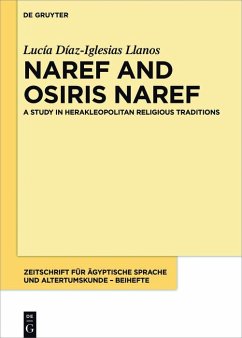The book aims to approach the funerary, legal, and royal mythological associations developed around Naref (an important landmark of the Herakleopolitan territory), attested for the first time in the so-called Coffin Texts and enduring until the Roman Period. It also seeks to analyse the characteristics of Osiris Naref, a prominent deity in the Herakleopolitan pantheon from the New Kingdom onwards who achieved suprarregional importance. His key features - centred on the mythical episodes of rebirth and defeat of enemies, justification, and assumption of royal power - gave rise to an Osirian form "who cannot/will not be evicted" from the legitimate and secluded place he has reached. Both aspects are analysed within the wider context of regional (religious, historical, landscape) characteristics.
This monograph offers valuable insights into the study of both local mythical and cultic toponyms and of regional manifestations of Osiris.
Dieser Download kann aus rechtlichen Gründen nur mit Rechnungsadresse in A, B, BG, CY, CZ, D, DK, EW, E, FIN, F, GR, HR, H, IRL, I, LT, L, LR, M, NL, PL, P, R, S, SLO, SK ausgeliefert werden.
Pierre P. Koemoth in: Bibliotheca Orientalis LXXIV N° 5-6, september-december 2017: 588-592
"Insgesamt lasst sich festhalten, dass Inhalt und Aufbau der Arbeit durchdacht und gut recherchiert sind. Auch die wissenschaftliche Literatur wurde umfassend rezipiert und wiedergegeben. Fur jede weitere wie auch immer geartete kunftige Beschaftigung sowohl mit dem Toponym Naref als auch mit der lokalen Gottheit des Orisis Naref wurde eine sehr hilfreiche, grundlich recherchierte und katalogisierte Auswertung und Aufarbeitung des Quellenmaterials zusammengestellt."
Mareike Wagner in: Orientalistische Literaturzeitung 114.1 (2019), 29-32


